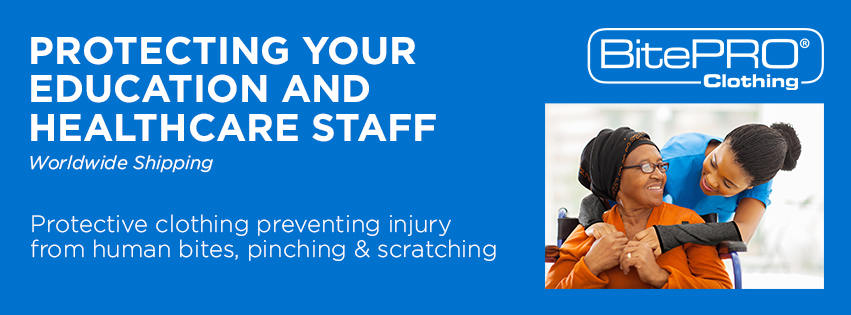What Are Challenging Behaviour Injuries?
The primary goal of BitePRO® is to reduce the risk of injury as a direct result of challenging behaviour. But what does that mean? And specifically, what are challenging behaviour injuries?
Challenging behaviour, also known as "behaviours which challenge", is defined as "culturally abnormal behaviour(s) of such intensity, frequency or duration that the physical safety of the person or others is placed in serious jeopardy, or behaviour which is likely to seriously limit or deny access to the use of ordinary community facilities". (Emerson, E. (1995) Challenging Behaviour. Analysis and Intervention in People with Learning Difficulties. Cambridge: Cambridge University Press.)
Challenging behaviour is often seen in people with health problems that affect communication and the brain, such as learning disabilities, autism or dementia. Such behaviour can include:
- Verbal aggression
- Physical aggression
- Self-harm
- Destructiveness
- Disruptiveness
It is important to differentiate between self-injurious behaviour and behaviour that injures other people. There appears to be a lot of research and literature on the subject of self-injury in association with challenging behaviour.
However, there is very little discussion when people with challenging behaviour injure other people i.e. healthcare, medical professionals or even loved ones.
Physical aggression is a commonly reported challenging behaviour, with 9.8% of the population with intellectual disabilities exhibiting it (Cooper et al, 2009), and may put carers at increased risk of injury.
Several research projects and studies have analysed violence towards carers working with this individuals displaying challenging behavior: Strand et al (2004) found that 54% of support workers were exposed to physical harm at least once a year. Many of which are now suffering from long term trauma.
Allen, Hawkins and Cooper (2006) stated that 24% of parents of children with severe challenging behaviour had been seriously injured as a result of their child’s behaviour.
We very much understand this is a very sensitive subject, and in my experience, the vast majority of individuals that cause injury to others through challenging behaviour, are not doing it intentionally. This is not a conscious, pre-meditated act of violence. Instead, it is invariably a form of communication. It is a way for a certain individual to control their environment when they are otherwise unable to easily communicate.
In the context of challenging behaviour there are specific behaviours that are likely to cause injury to others or oneself, the most common being:
- Biting
- Scratching
- Kicking
- Punching
- Grabbing
- Hair pulling
- Squeezing
- Limb twisting
- Pinching
- Head banging
Protecting Yourself From Challenging Behaviour Injuries
Specially designed protective clothing & armguards are being effectively utilised by those who support, care for, and educate individuals with challenging behaviour. We at BitePRO® supply individuals in the medical, care and special education industries worldwide. However, we also have a growing number of private individuals who wish to protect themselves from others i.e. family members or loved ones displaying challenging behaviour.
The injuries can be as obvious as a bite, bruise or scratch, but often also have associated psychological trauma. This is a genuine risk for many professionals around the world, and unfortunately there seems to be limited support, knowledge or guidance on the subject. Many of those professionals may even believe that ‘this is a part of the job’.
We feel that a good starting point would be to raise awareness and get people openly speaking about the subject. With that in mind, we recently undertook a survey and then published a white paper specifically on the subject of challenging behaviour injuries in the workplace. Download your free copy now.
Please share with us what impact challenging behaviour is having on you. Are you a healthcare or education professional, psychiatric social worker or a parent caring for a child displaying such behaviour? Your experience, and you speaking about it can help others.
About the Author
Robert Kaiser is the Founder and CEO of BitePRO®, the world's first specialised brand of protective clothing, offering dependable scratch and bite protection for healthcare workers, education professionals, and others working with individuals displaying challenging behaviour. Robert is a widely respected expert in workplace violence and violence prevention. His written work has been published in several international industry leading publications.




